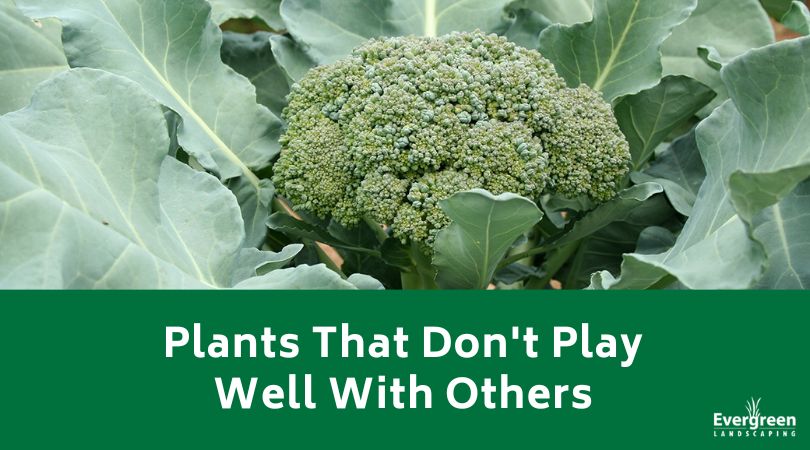
Some plants are companions. They share nutrients through their roots and have a symbiotic relationship. Other plants vie for nutrients, light and space. We’re sharing information about plants that don’t play well with others with you to help you plan your landscaping.
Vegetables That Don’t Grow in Harmony
Did your vegetable garden disappoint you last summer? Maybe the problem was your garden layout. Some vegetables and herbs don’t flourish when planted together. Common problem plants in the garden are:
• Broccoli
• Squash/Pumpkins
• Potatoes
• Tomatoes
• Peppers
• Beans/Peas
These veggies are some of the most popular garden plants. Why don’t they get along, and how can you plan your garden around their needs?
One theory about vegetables that can’t be planted side-by-side is that summer and fall or winter vegetables have different needs and will not reach their full potential growing together. Another theory is that some vegetables (and herbs) fight for the same nutrients.
Let’s divide vegetables into hot and cool. Separate spicy, hot or pungent veggies like Peppers, Onions and Garlic from mild vegetables like Broccoli, Beans and Peas. Tomatoes need their own space. Root vegetables like Potatoes and Carrots should be separated from warm weather and warm-tasting summer vegetables. Potatoes need a garden plot all to themselves.
An easy way to decide what to plant where is to keep in mind the concept of seasonal eating. If you wouldn’t harvest vegetables at the same time, don’t plant them in close quarters.
Difficult Herbs
Herbs are just as persnickety as some vegetables. Some problematic herbs are:
• Basil
• Dill
• Cilantro
• Lavender
• Rosemary
• Thyme
Basil is best grown on its own in pots or in pots with Tomatoes. It clashes with root vegetables like Potatoes.
Dill growing close to Carrots can stunt the growth of both plants. Cilantro and Tomatoes are poor companions.
Lavender grows quite large in sandy, well-drained soil and can suck up all the nutrients in the surrounding area. Don’t put it in your kitchen garden. Keep Rosemary and Thyme away from veggies like Cukes. Again, some herbs are best grown in pots, preferably large clay planters.
Marigolds are popular as herbs and garden flowers. Their bright yellow petals attract pollinators and repel mosquitoes. Plant Marigolds on the opposite side of the garden from Beans and Peas. Sunflowers are a garden classic, but due to their height, you should plant them a couple of feet from your herbs and vegetables, preferably by a fence that can support their stems when they reach their full height.
Planning Your Garden
Your local Pismo Beach landscapers know how to bring out the best in your garden. They can help you with plants and placement. Your landscaper will also make sure that your garden has proper irrigation.
Things to Remember:
• Eating in season helps you keep competitive plants apart in the garden
• Grow herbs in pots for best results
• Hot and spicy plants and mild flavored plants shouldn’t be planted close together
It’s time to plan your summer vegetable garden, so contact us today for plants, irrigation and advice.
